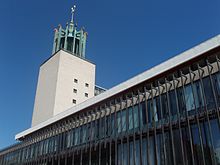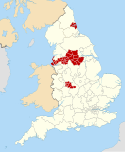Newcastle City Council | |
|---|---|
 | |
| Type | |
| Type | |
| Leadership | |
Pam Smith since January 2022[1] | |
| Structure | |
| Seats | 78 (40 needed for a majority) |
Political groups |
|
Joint committees | North of Tyne Combined Authority |
Length of term | 4 years |
| Elections | |
| First past the post | |
Last election | 4 May 2023 |
Next election | 2 May 2024 |
| Meeting place | |
 | |
| Civic Centre, Barras Bridge, Newcastle upon Tyne, NE1 8QH | |
| Website | |
| www | |
Newcastle City Council is the local authority for Newcastle upon Tyne, a metropolitan borough with city status in the ceremonial county of Tyne and Wear in North East England. The council consists of 78 councillors, three for each of the 26 wards in the city. It has been under Labour majority control since 2011. The council is a member of the North of Tyne Combined Authority.
History[edit]
Newcastle was an ancient borough; it is said to have been made a borough by William II (reigned 1087–1100). In 1400, a new charter from Henry IV gave the borough the right to hold its own courts and appoint its own sheriffs, making it a county corporate, independent from the Sheriff of Northumberland.[2]
Newcastle was reformed to become a municipal borough under the Municipal Corporations Act 1835, which standardised how most boroughs operated across the country. It was then governed by a body formally called the "mayor, aldermen and burgesses of the borough of Newcastle upon Tyne", generally known as the corporation or town council.[3] Newcastle was awarded city status in 1882, after which the corporation was also known as the city council. When elected county councils were established in 1889, Newcastle was considered large enough to provide its own county-level services, and so it was made a county borough.[4] In 1906 the city was given the right to appoint a Lord Mayor.[5]
In 1974 the county borough was replaced by a larger metropolitan borough within the new county of Tyne and Wear.[6][7] Newcastle's city status was transferred to the enlarged borough at the same time.[8]
From 1974 until 1986 the city council was a lower-tier district authority, with Tyne and Wear County Council providing county-level services. The county council was abolished in 1986, since when the city council has again provided both district-level and county-level services, as it had done when it was a county borough prior to 1974. Some functions are provided across Tyne and Wear by joint committees with the other districts.[9]
Governance[edit]
Since 1986 the council has provided both district-level and county-level functions, with some services being provided through joint arrangements with the other Tyne and Wear councils. Since 2018 the council has been a member of the North of Tyne Combined Authority, which is due to be replaced by the larger North East Mayoral Combined Authority in May 2024.[10]
Political control[edit]
The council has been under Labour majority control since 2011.
Political control of the council since the 1974 reforms has been as follows:[11][12]
| Party in control | Years | |
|---|---|---|
| Labour | 1974–2004 | |
| Liberal Democrats | 2004–2011 | |
| Labour | 2011–present | |
Leadership[edit]
The role of Lord Mayor of Newcastle upon Tyne is largely ceremonial. Political leadership is instead provided by the leader of the council. The leaders since 1959 have been:[13]
County Borough
| Councillor | Party | From | To | |
|---|---|---|---|---|
| T. Dan Smith | Labour | 1959 | 1965 | |
| Frank Butterfield | Labour | 1965 | 1966 | |
| Arthur Grey | Conservative | 1967 | 1972 | |
| John Cox | Conservative | 1972 | 1974 | |
Metropolitan Borough
| Councillor | Party | From | To | |
|---|---|---|---|---|
| Tom Collins | Labour | 1974 | 1977 | |
| Jeremy Beecham | Labour | 1977 | 1994 | |
| Tony Flynn | Labour | 1994 | 2004 | |
| Peter Arnold | Liberal Democrats | 2004 | 2006 | |
| John Shipley | Liberal Democrats | 2006 | 1 Sep 2010 | |
| David Faulkner | Liberal Democrats | 1 Sep 2010 | 25 May 2011 | |
| Nick Forbes | Labour | 25 May 2011 | 8 May 2022 | |
| Nick Kemp[14] | Labour | 25 May 2022 | ||
Composition[edit]
Following the 2023 election and subsequent by-elections and changes of allegiance up to March 2024, the composition of the council was:[15][16]
| Party | Councillors | |
|---|---|---|
| Labour | 47 | |
| Liberal Democrats | 23 | |
| Newcastle Independents | 4 | |
| Independent | 4 | |
| Total | 78 | |
The next election is due in May 2024.
Premises[edit]
The council is based at the Civic Centre on Barras Bridge.[17] It was purpose-built for the council in phases between 1956 and 1967.[18] The finished complex was formally opened on 14 November 1968 by King Olav V of Norway.[19]

The Civic Centre replaced Newcastle Town Hall, which had been built in 1863 in St Nicholas Square, and was subsequently demolished in 1973. The Town Hall in turn had replaced the Guildhall on Sandhill, which had been built in 1655 on a site which had been used for the town's guildhall since at least the thirteenth century.[20][21]
Elections[edit]
Since the last boundary changes in 2018 the council has comprised 78 councillors representing 26 wards, with each ward electing three councillors. Elections are held three years out of every four, with a third of the council (one councillor for each ward) elected each time for a four year term of office.[22]
Wards[edit]
- Arthur's Hill
- Benwell and Scotswood
- Blakelaw
- Byker
- Callerton and Throckley
- Castle
- Chapel
- Dene and South Gosforth
- Denton and Westerhope
- Elswick
- Fawdon and West Gosforth
- Gosforth
- Heaton
- Kenton
- Kingston Park South and Newbiggin Hall
- Lemington
- Manor Park
- Monument
- North Jesmond
- Ouseburn
- Parklands
- South Jesmond
- Walker
- Walkergate
- West Fenham
- Wingrove
See also[edit]
References[edit]
- ^ "Chief executive and directors". Newcastle City Council. Retrieved 30 March 2024.
- ^ Report of the Commissioners Appointed to Inquire into the Municipal Corporations in England and Wales: Appendix 3. 1835. pp. 1633–1635. Retrieved 29 March 2024.
- ^ Municipal Corporations Act. 1835. p. 457. Retrieved 29 March 2024.
- ^ "Local Government Act 1888", legislation.gov.uk, The National Archives, 1888 c. 41
- ^ "No. 27936". The London Gazette. 31 July 1906. p. 5232.
- ^ "Local Government Act 1972: Schedule 1", legislation.gov.uk, The National Archives, 1972 c. 70 (sch. 1), retrieved 25 March 2024
- ^ "The Metropolitan Districts (Names) Order 1973", legislation.gov.uk, The National Archives, SI 1973/137
- ^ "No. 46255". The London Gazette. 4 April 1974. p. 4400.
- ^ "Local Government Act 1985", legislation.gov.uk, The National Archives, 1985 c. 51, retrieved 29 March 2024
- ^ "North East devolution deal". GOV.UK. Retrieved 29 December 2022.
- ^ "Compositions calculator". The Elections Centre. Retrieved 10 August 2022.
- ^ "Newcastle-Upon-Tyne". BBC News Online. 19 April 2008. Retrieved 24 March 2010.
- ^ "Council minutes". Newcastle City Council. Retrieved 17 August 2022.
- ^ "Leader of the Council - Newcastle City Council". www.newcastle.gov.uk.
- ^ "Local elections 2023: live council results for England". The Guardian.
- ^ "Local Councillors | Newcastle City Council".
- ^ "Contact us". Newcastle City Council. Retrieved 31 March 2024.
- ^ Historic England. "Civic Centre (Grade II*) (1242692)". National Heritage List for England. Retrieved 31 March 2024.
- ^ Morton, David (14 November 2018). "Newcastle Civic Centre at 50: A royal opening and green turtle soup!". Chronicle Live. Retrieved 31 March 2024.
- ^ Historic England. "The Guildhall and Merchants' Court, Sandhill (Grade I) (1120877)". National Heritage List for England. Retrieved 31 March 2024.
- ^ Ford, Coreena (3 February 2016). "Café at Newcastle's Guildhall could be on the horizon as leisure entrepreneur makes plans". Chronicle Live. Retrieved 31 March 2024.
- ^ "The Newcastle upon Tyne (Electoral Changes) Order 2017", legislation.gov.uk, The National Archives, SI 2017/1080, retrieved 30 March 2024
- ^ "My Neighbourhood - My Neighbourhood". community.newcastle.gov.uk.
- ^ "Electoral Review | Newcastle City Council". Government of the United Kingdom. Retrieved 11 June 2017.
